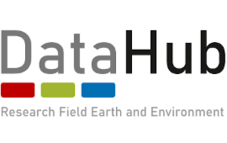
The DataHub is a cross-center, integrative initiative with the participation of the seven research centers of the Research Field Earth and Environment in the Helmholtz Association and is anchored in the joint research program of the research field in order to bring together the previously separate data of marine, terrestrial and atmospheric research and its cross-sectional fields in an open, interoperable information infrastructure (hub). The data of the research area will thus be made accessible in accordance with the FAIR principles.
As a cross-cutting activity of the "Changing Earth" research programme and a facilitator for data-driven sciences, the DataHub makes a significant contribution to promoting digitalization in research and the associated cultural change. The tools and services of the DataHub are to be used in the topics of the joint research program across all centers in the research area "Earth and Environment" in scientific work with data and help to address the research questions posed effectively and efficiently in PoF IV and V using modern IT-supported methods.
As a cross-center, networked and interoperable data infrastructure with an interlinked range of digital tools and services tailored to research, the focus is on the integration and interlocking of various digital tools, their further development and anchoring in productive operation.
The DataHub aims to enable access and easy working with research data across all compartments. Development and operation focus on the three important tasks
- provision of decentrally stored data in the integrating Earth Data Portal (www.earth-data.de),
- provision of tools for integrating research data into own work processes and workflows, and
- strengthening systematic research data management by establishing and expanding end-to-end digital processes from data collection to archiving.
The DataHub forms a digital ecosystem that facilitates the shared use of research data and collaboration between researchers from different scientific disciplines and institutions. For this purpose, the DataHub offers various tools not only for the management and exchange of data, but also for their annotation, visualization and analysis in order to improve data processing and interpretation. The data infrastructure with its digital tools will cover the entire data life cycle from sensor to publication and support researchers with a customized and interlinked range of services in the various, successive work with research data as far as possible in self-service and made available to the community in the field of earth system science and beyond.
The DataHub is closely embedded in the development of the National Research Data Infrastructure (NFDI) and the European Open Science Cloud (EOSC). In addition, networking with other data-holding sources in the field of Earth system sciences, such as the national geodata infrastructure GDI-DE or the national infrastructure for marine data MDI-DE, is being promoted.
The DataHub technologies have now been developed to such an extent that thematic viewers for specific research questions can be easily implemented. Exemplary workflows have been conceptually prepared and implemented for specific application scenarios, enabling the integration of own data into scenario calculations, which simplifies the future development of digital twins. Automated access to research data (machine-readable), as required for applications using artificial intelligence, was also implemented as an example.